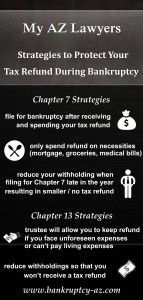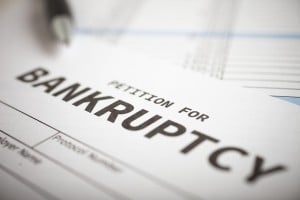Will You Lose Your Tax Return to the Trustee if You Are Filing For Bankruptcy in Mesa?

Will You Lose Your Tax Return to the Trustee if You Are Filing For Bankruptcy in Mesa?
Now that we are approaching the end of the year, many Mesa residents are gathering tax and income information to assess what kind of spending they have done during the year, what they need to spend or invest into before the year is over.
The time to file tax returns is not far away and having all your information and documents in order is a tremendous help.
While most have a pretty good idea of how their tax refund is going to look like, those who have filed for Chapter 7 or 13 Bankruptcy in Mesa may wonder what will actually happen to their refund (if they end up getting one).
Whether or not you will be able to protect and keep your Mesa tax refund depends largely on what type of bankruptcy you filed for, when you filed and if you took precautions to protect your tax refund. Fact is that if you filed for Chapter 7, your chances of “protecting” your tax refund from the bankruptcy trustee are much higher than if you are dealing with a Chapter 13.
Consulting an experienced Mesa bankruptcy attorney is essential when trying to make the most of your tax refund while also dealing with a bankruptcy filing. To help you with tax return considerations and bankruptcy implications, we have compiled some information to help you.
Here are some important consideration about whether you will be able to keep your tax refund while also dealing with bankruptcy:
Keeping your Tax Refund During a Chapter 7 Bankruptcy:

Generally speaking, most individuals who file for Chapter 7 bankruptcy are able to protect their tax refund. Whether or not the bankruptcy trustee ends up taking your tax refund check depends on when you file, the type of bankruptcy you file, and the precautions you take in order to protect your refund.
With a capable bankruptcy attorney and some careful planning, you do have a good chance of keeping your refund in a Chapter 7 filing.
Your tax refund is considered an asset, whether you have received the tax refund already, or you are expecting it. Because it is an asset, a tax refund can be considered exempt and the bankruptcy trustee cannot take it. The allowable exemption amounts for various assets vary, so the amount of your tax refund that you can exempt depends on your state. If no specific exemption is in place, you may be able to apply the “wildcard” exemption.
Consult with a qualified Mesa, Arizona bankruptcy attorney to discuss the specific exemptions for tax refunds.
When to File for Bankruptcy to Protect Your Tax Return in a Chapter 7 Bankruptcy:
Strategies to protect your tax refund include careful timing of when to file Chapter 7. Carefully plan this and make certain to have no assets left from your tax refund to list on your bankruptcy petition.
The best solution would be to file for bankruptcy after you have received and spent your refund.
If you choose to do this and file Chapter 7 after receiving and spending your tax refund, you need to make sure that you spent that refund on necessities, and not to purchase new assets.
Necessities, for example, include living expenses, clothing, mortgage, medical expenses, food, car repairs and maintenance, home repairs, educational expenses, insurance and others. You may also use your tax refund to pay your bankruptcy attorney for the costs of your Chapter 7 case.
If you end up filing for bankruptcy later in the year, you could decrease your payroll withholdings and try to avoid receiving a tax refund altogether.
Keeping Your Tax Refund During Chapter 13 Bankruptcy Filing:
Because a Chapter 13 bankruptcy includes a type of payment plan, which spans the course of three to five years, your tax refunds will be scrutinized by the trustee during this time.
A trustee does have the discretion to keep your tax refund during the course of the payment plan if your plan pays less than 100% of your debt back to creditors. However, a trustee may classify a tax refund as disposable income; and a Chapter 13 requires all disposable income be paid. Also, because the tax refund is disposable income, the amount paid into the plan does not reduce the plan payment.
Ways to Keep Your Tax Refunds if you File a Chapter 13 Bankruptcy:
First and foremost it is always essential to seek the assistance of an experienced Chapter 13 Arizona bankruptcy attorney to obtain information and advice on how to proceed with your bankruptcy, as well as evaluate your options.
Even with Chapter 13 there are preventative options available to you, as well as special circumstances in which the trustee may allow you to keep a tax refund, as the decision is largely at the discretion of the trustee.
Special circumstances include, for example, the inability to pay for living expenses or suddenly facing unforeseen hardship.
Another strategy, much like with Chapter 7 is to reduce your federal withholding to ensure that your return is as small as possible and thus leaving the trustee with less of your refund to take.
Having an experienced Mesa attorney who is knowledgeable about Chapter 13 bankruptcy to be your advocate is a huge advantage, and could help you attain your desired outcome for your case; however, in many cases the trustee requires that your tax refund be a contribution as part of your Chapter 13 plan.
The bankruptcy lawyers at My AZ Lawyers have years of experience in representing Mesa clients during their bankruptcy filings. We can carefully advise you in which chapter is right for you and how to best protect your tax refund and other assets.
Bankruptcy is a chance to get your financial life back in order and our Mesa Chapter 7 and Chapter 13 bankruptcy attorneys strive to help you during this challenging time of your life.
To find out which bankruptcy chapter is right for you and what options to protect your refund are available to you, contact our office today.
The My AZ Lawyers – Candace Kallen
1731 W. Baseline Road, Suite 101
Mesa, AZ 85202
Office: (480) 263-1699
20325 N. 51st Ave., Suite #134
Glendale, AZ 85308
Office: (623) 640-4945
2 East Congress St., Suite 900
Tucson, AZ 85701
Office: (520) 306-8729


